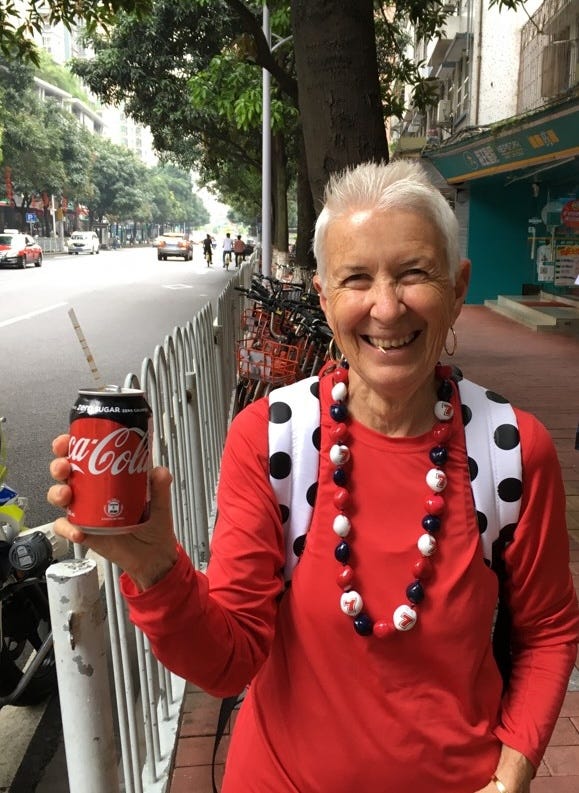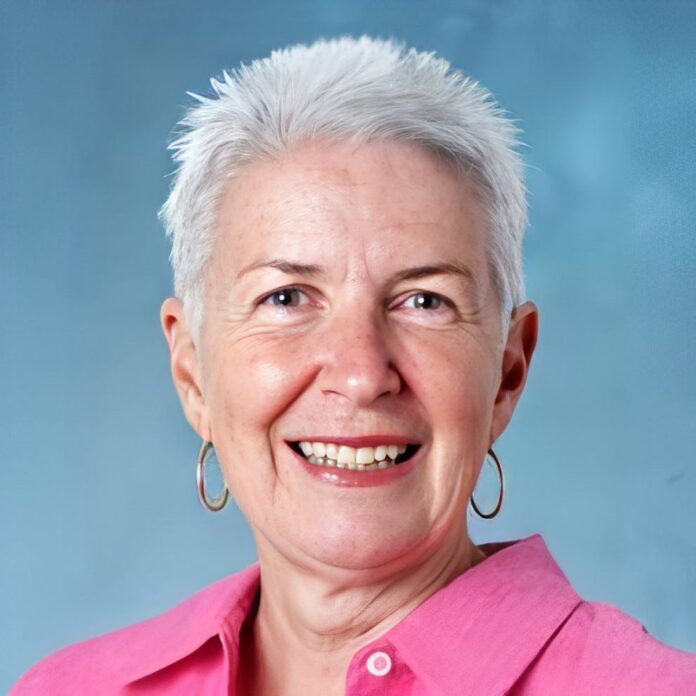Education Revolution: Mary Banks Of Quad Education On Innovative Approaches That Are Transforming Education
An interview with Eden Gold
How important holding myself and others accountable was.
The landscape of education is undergoing a profound transformation, propelled by technological advancements, pedagogical innovations, and a deepened understanding of learning diversities. Traditional classrooms are evolving, and new modes of teaching and learning are emerging to better prepare students for the complexities of the modern world. This series will take a look at the groundbreaking work being done across the globe to redefine education. As a part of this interview series, we had the pleasure to interview Mary Banks.
Mary Banks is the Director of Admissions Consulting at Quad Education. She is also the former Director of Admissions at the Columbia School of Nursing and former Director of Admissions for the School of Education, Nursing, and the Arts at NYU.
Thank you so much for doing this with us! Our readers would love to “get to know you” a bit better. Can you share the “backstory” behind what brought you to this particular career path?
I always dreamed of being an educator, a teacher, and that is where I began my life’s journey: in the classroom. As a true believer in education, I continued pursuing a number of degrees, leaving the classroom to work in college administration while pursuing advanced degrees chosen to enhance my lifelong ambition to work with students. Somehow my dreams came true and I began working at Columbia. The rest, so to speak, is history. I was able to work at Columbia, NYU, Columbia Nursing School, Cardozo Law School and more. Regardless of the position, I always have my student hat prominently fixed to my head. I remain committed to building a pathway for students to find success that includes making the world a better place, not empty rhetoric, but an authentic goal of my educational mission.
Can you share the most interesting story that happened to you since you started your career? Can you tell us what lesson you learned from that?
I had a student from Colorado who graduated from Columbia from. I reconnected with him in Colorado. He started his own bank in San Francisco. I was recommending a student to him for an internship. He called me back irate and said, didn’t you realize that this guy has stalking charges. I said, no. He asked, Don’t you Google every student you meet with? I said, no. So I learned that I should research the background of students before making an active recommendation.
Can you briefly share with our readers why you are an authority in the education field?
I am a college graduate, was a teacher, a reading specialist, got a masters in higher education, and almost got my doctorate from Columbia. Then I worked in admissions, student affairs, employee relations, and finance. As a result, I feel very well prepared to deal with students.
Can you identify some areas of the US education system that are going really great?
New delivery methods for education — both helped and hindered by the pandemic — are replacing the often boring lecture model. Teachers had to develop new skills using modalities that students go to every minute of the day. This will save us from obsolescence. We’re also seeing more pairing school with career and hence, making it real, which is one of the most important things in junior high. It helps you understand the relevance of the things you’re learning in the real world.
Can you identify the key areas of the US education system that should be prioritized for improvement? Can you explain why those are so critical?
It’s crucial to meld academics with career services, building partnerships between faculty and career staff and encouraging internships in higher education. This is critical because that’s what parents and students are looking for. We shouldn’t lose sight of the joy of learning but we have to respond to our audience; parents who are paying large sums of money for their students’ education want to know the ROI. They want to know that they’re creating a young person who can make a difference in their life.
Please tell us all about the innovative educational approaches that you are using. What is the specific problem that you aim to solve, and how have you addressed it?
As an admissions counselor, we’re using an insightful probing document and a personal assessment that helps us define the whole person. Students are reluctant to share who they are. We want students to reveal themselves so they can be purposefully focused on whatever it is they’re going to pursue.
In what ways do you think your approach might shape the future of education? What evidence supports this?
I try to personalize every student interaction. I try to focus and be intentional. My mantra is I care and my career has been a testament to that. The greatest compliment I received from the very aggressive MBAs in Columbia in New York was — I come into your office, I am angry or frustrated by something in my career but I leave feeling better than how I entered. So, I could tell that they felt heard.
How do you measure the impact of your innovative educational practices on students’ learning and well-being?
Measuring impact is always the final piece of the picture and the most beguiling. I believe circling back with students using both actual, personal outreach to follow up with career success and personal contributions to social welfare are critical to determining my worth. I also have participated in massive outreach documents that our institutions have used to prove the efficacy of our educational practices. My personal belief is that I remain in touch over the years to keep current with those students where I have made a positive impact. I have used this approach when sharing information with current youngsters, building a circle of mentors who carry the message of how to build a life after college. The college/grad rankings of different organizations do speak to the way students view our organizations and how we have met or not met their expectations. We use these instruments to make us better.
What challenges have you faced in implementing your educational innovations, and how have you overcome them?
The challenges of implementation are legion with the most recent being how to meld the academic side of the aisle with the career preparation as demanded by parents and students. Building solid relationships with faculty is an important part of our recent innovations in delivering services to our constituents. All too often, our work has been siloed. Now we are making advances where faculty is coming to campus not to simply deliver a lecture, but to interact with students and administrators where the “action” is building a common bond to ensure our graduates are prepared to think critically and contribute to a socially responsible business model regardless of their declared major.
Keeping in mind the “Law of Unintended Consequences,” can you see any potential drawbacks of this innovation that people should think more deeply about?
Unintended consequences are an integral part of effecting change. We have to be prepared to be accountable: if we encourage free speech in the academy and students get involved in protesting, we need to be able to defend their rights to peaceful protest. For every action there is always an opposite reaction and we have to engage in authentic communication that does not include violence. We need to have faith in the generation we are educating: they will embody the difference between right minded actions and the wrong approach some have advocated. Children grow up knowing that their actions may result in behaviors they never considered. Building on this, we can empower others to advocate for change knowing full well that unintended consequences linger on the periphery of change.

What are your “5 Things I Wish I Knew When I First Started”?
- How important listening was
- How far empathy went and not criticism
- The Importance of building genuine relationships,
- The power of leading by example
- How important holding myself and others accountable was
Can you please give us your favorite “Life Lesson Quote”? Can you share how that was relevant to you in your life?
“It’s not just a trip, it’s a journey — everything counts.” I have always wanted to make a difference in each life I touched as an educator or a simple citizen. Life is meaningful when you have connections that make your day
We are blessed that some of the biggest names in Business, VC funding, Sports, and Entertainment read this column. Is there a person in the world, or in the US, with whom you would love to have a private breakfast or lunch, and why? He or she might just see this if we tag them 🙂
Larry Fink, CEO of BlackRock — his wisdom goes beyond making money. He uses a system called Aladdin to drive business models. He has a mantra — what’s your why, what makes you tick. He wants people to bring personal purpose to work and not just the bottom line.
How can our readers further follow your work online?
https://www.linkedin.com/in/mary-banks-83b93
Thank you so much for these insights! This was so inspiring!
About The Interviewer: Eden Gold, is a youth speaker, keynote speaker, founder of the online program Life After High School, and host of the Real Life Adulting Podcast. Being America’s rising force for positive change, Eden is a catalyst for change in shaping the future of education. With a lifelong mission of impacting the lives of 1 billion young adults, Eden serves as a practical guide, aiding young adults in honing their self-confidence, challenging societal conventions, and crafting a strategic roadmap towards the fulfilling lives they envision.
Do you need a dynamic speaker, or want to learn more about Eden’s programs? Click here: https://bit.ly/EdenGold
Education Revolution: Mary Banks Of Quad Education On Innovative Approaches That Are Transforming… was originally published in Authority Magazine on Medium, where people are continuing the conversation by highlighting and responding to this story.


